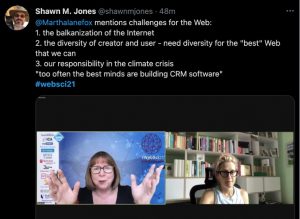#websci21: Review of Day 3
Meet the Authors
The “Four Internets” chat hosted by Anni Rowland-Campbell featured authors Kieron O’Hara & Wendy Hall discussing their book “Four Internets: Data, Geopolitics and the Governance of Cyberspace” which focuses on how the internet has been fractured by Data, Geopolitics and the Governance of Cyberspace. Starting as a libertarian space of freedom of speech, the growth of the Internet brought in other ideologies – human rights, paternalist structures and commercialisation.
The pandemic turned the internet from a pretty crucial structure into a critical structure – people needed to be online. There is now an increased reliance, particularly in the rich democracies and in the global south – on things like payments, news and access to other people. Kieron proposed the idea that we have now have a 5th internet – “the Covid internet” – growing out of the pandemic. Expectations of this include faster flows of medical data, more inclusion, less misinformation, support for e-commerce, more support for augmented reality. Data privacy and protection being moderated. Social and national security over civil liberties. The authors agreed that the decentralised nature of the web is the key to its success.
The formal conference begins
Dame Wendy Hall spoke with President of the ACM: Gabriele Kotsis & President-Elect of ICA: Noshir Contractor, who offered their ideas of the future Web and some background on their experiences of Web Science within their own respective environments.
Baroness Martha Lane Fox: Future of the Internet
Dame Wendy Hall then spoke to Baroness Martha Lane Fox, talking about her contributions to public policy and the technological debate. Discussing her life story and her instrumental work at lastminute.com, which she and her co-partner sold in 2005, Martha also played a role in the creation and development of the successful gov.uk website. The two speakers also discussed the legislation processes and work going on within select committees and the House of Lords in regard to subjects relevant to Web Science.
 Doteveryone was started in 2015, just before Cambridge Analytica happened. People were already starting to get nervous about the power of Silicon Valley. In a lecture on BBC1, Martha proposed a new organisation that was for everyone, which she then started. The organisation worked for 5 years to start the conversation about responsible technology, a conversation which is still considered crucial to the ethos of Web Science.
Doteveryone was started in 2015, just before Cambridge Analytica happened. People were already starting to get nervous about the power of Silicon Valley. In a lecture on BBC1, Martha proposed a new organisation that was for everyone, which she then started. The organisation worked for 5 years to start the conversation about responsible technology, a conversation which is still considered crucial to the ethos of Web Science.


